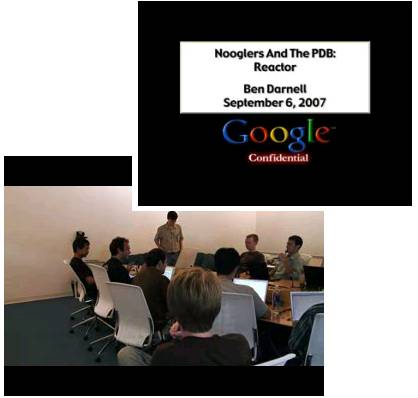Tuesday, September 11, 2007
Leaked Google Video Discusses Google Reader, Social Efforts

A video disclaimed to be “Google - Confidential” with the title “Nooglers And The PDB: Reactor (Ben Darnell, September 6, 2007)” made its way onto a public Google Video page. A “noogler” is what people at Google call new employees; “Reactor” is Google’s codename for the back-end to Google Reader, the video says, and someone posting under the nickname “Fanboy” in this blog’s forum provided us with a nutshell of the talk. While the video has been removed by now, others – including Ionut Alex. Chitu, who also blogged on this in the meantime – were able to see it, and I’ve also got hold of a copy.
Now, I can confirm that projects by the name of “Mustang” and “Mocha”, as mentioned in the nutshell, exist within Google; I can also confirm that a Ben Darnell works at Google (update: I now have reason to believe it’s spelled “Maka-Maka”, even though as mentioned something called “Mocha” does exist within Google). This and other details make it look like the video is real indeed. Following is Fanboy’s nutshell (my emphasis):
Google will work on a standard for feed publishers to tell aggegrators about changes in the feed (’this post has been deleted’ etc.). Such a standard doesn’t exist yet. They will be working with blog tools like Blogger and MovableType.
2/3 of the content has only one subscriber. Think about feeds for own-name-searches, own blogs and blog comments. There are feeds with up to tens of millions of subscribers. The crawl rate of feeds is prioritized when they’ve got more subscribers. They’re updated within one hour when there’s more than one subscriber, or else once in three hours.
The feed backend now contains 10 terabytes of raw data from 8 million feeds. The index size grows with 4% a week, but this number is probably not accurate.
Currently the standard distributed database called BigTable is mostly used. For search Mustang is currently used, Google’s library for creating search engines. Mustang underlies the web search and most other search engines, except for Gmail’s search feature as that requires instant updates and a specific index for each user. Mustang currently handles 1-2 search queries per second, but is able to handle thousands.
The Reader team is going to integrate more social features. Currently items can be sent to friends by email, and there are no plans for creating a Reader-inbox for that.
Google’s recent big social effort is called Mocha-Mocha (or Mocka-Mocka?), and will become the infrastructure for all social stuff across all of their applications. As a part of this, a new feature called Activity Streams will be introduced or at least implemented in Reader this quarter. This will be comparable to Facebook’s News Feed (Minifeed?) feature, and integrate Gmail’s addressbook and contact list.
Also there will be some other Gmail and Orkut integration, but this might just mean there will be links to Reader.
Google is interested in allowing users to comment on items they share, but this currently isn’t a priority.
Calling tags ’labels’ is called ’kind of a historic accident and needlessly confusing’.
When you press the ’Mark all as read’ button, Google remembers that you’ve ’read’ all items between two timestamps. You can never uncheck the ’Mark as read’ checkbox for those items.
Currently there is no plan to integrate Reader with Universal Search. This is because Universal Search doesn’t provide its backends with user IDs (so Gmail results can’t be shown either), and because it requires a lookup time of less than 1/4 second, which Reader cannot provide yet.
When searching in Reader, you may also get results from before you aren’t subscribed to anymore, or from your friends’ items. This is intentional, but by some users considered as a bug.
Three people are working on Reader’s backend, and three plus one intern are working on the frontend.
Very soon, Reader will recommend feeds to the user, based on previous subscriptions and other Google activity.
Next week, Reader will be released in several languages. One month after that, it will be available in 40 languages.
According to FeedBurner statistics, Google Reader is the world’s largest full-content reader. My Yahoo is the largest headline reader, [but] also iGoogle is big. As Google has grown into the market, the usage of Bloglines hasn’t really decreased much.
Reader has a loyal user base (based on pageviews per user), higher than any other product except for Gmail and Orkut. 70 % of the users use Firefox, so feed syndication is still mostly a geek thing.
Feeds are currently monetized by FeedBurner. Reader might be more directly monetized in the future, but Google wants to watch out showing ads next to other people’s content. This is a problem with Google News too. They might do something like they did with the non-free Opera: show the content owners’ ads in the interface when they’re AdSense publishers. Google wants to make publishing full articles in feeds more interesting to webmasters by creating ways to monetize them.
[Thanks Fanboy!]
>> More posts
Advertisement
This site unofficially covers Google™ and more with some rights reserved. Join our forum!
